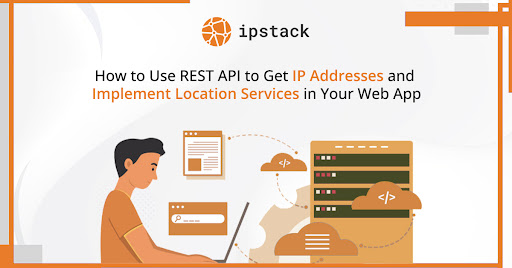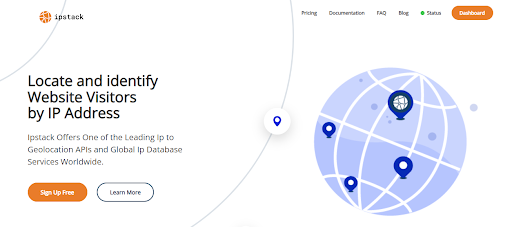
How to Use REST API to Get IP Addresses and Implement Location Services in Your Web App
In today's interconnected world, gathering and utilizing accurate location data is crucial for various applications. One effective way to obtain this valuable information is through a REST address API. These APIs provide us access to vast databases of IP address data. In this blog, we will explore leveraging a REST address API to obtain IP addresses and implement location services in your web application.
We will begin by explaining the fundamentals of REST (Representational State Transfer) APIs. Specifically, we will focus on REST address APIs, which specialize in retrieving and processing IP address data. Our next step will be understanding the common use cases of IP address API. Integrating an address API into your web app offers numerous advantages.
We will also explore IPstack, a popular IP geolocation API provider. Then, we will guide you through integrating an IPstack API key into your web application. By the end of this blog, you will have the knowledge and tools to harness the power of REST address APIs. Hence enabling you to unlock the potential of IP address data and implement location services seamlessly in your web app.

What Is REST Address API?
The term "REST Address API" refers to an API (Application Programming Interface) that follows the principles of Representational State Transfer (REST) and provides address-related.REST functionality is an architectural style for designing networked applications, particularly web services. Moreover, it uses standard HTTP methods like GET, POST, PUT, and DELETE to perform operations on resources.
When it comes to addresses, a REST Address API typically allows developers to retrieve, validate, and manipulate address data programmatically. Furthermore, it provides endpoints or URLs that developers can interact with to perform various address-related operations.
IPstack
It is an IP geolocation API service that provides developers with information about IP addresses. It offers a RESTful API that allows you to retrieve geolocation data based on IP addresses, such as the country, city, latitude, and longitude associated with a specific IP address.
IPstack allows you to effortlessly retrieve this information in JSON or XML format for easy analysis and processing. Hence ensuring you can access it within seconds.
Utilizing a tool like IPstack offers several advantages.
- Firstly, it enhances your ability to efficiently identify potential threats from risky IP addresses. By swiftly identifying and recognizing rogue addresses accessing your site, IPstack helps maintain its security.
- Additionally, IPstack lets you personalize your visitors' experience based on location. For instance, you can identify a user's country through their IP address and adjust language settings accordingly. Alternatively, you can prioritize certain content on your website based on the user's region, tailoring the experience to their specific location.

What Are The Common Use Cases Of IP Address Data API?
The location service API provides various use cases for locating online customers. Here are some examples:
- Targeting Ads
- Creating a Localized Experience
- Translating Key Messages
- Integrating IP Location API
The IP API enables targeted ads for users in different locations. Customers nearby can purchase physical products, while those farther away can be offered online booking or virtual usage options.
The IPstack Geolocation API lets your website display relevant country or state names. Hence, giving users a localized feeling. This helps attract more customers to your business.
Instead of translating entire websites, the Location API can translate important messages like titles and calls to action. This reduces bounce rates and increases conversion rates. You can also change the primary currency.
By integrating geolocation services with your website, businesses can enhance visitors' user experience. Sending visitors' IP addresses to the API provides valuable location-based data to customize users' experiences from different locations.

Why Should You Integrate IPstack Address API into Your Web App?
IPstack is the top choice for an IP address API due to its outstanding features. Its premium qualities set it apart. Hence, it is a robust solution for development tasks requiring locating or verifying users' locations.
Here are some key features that make IPstack an ideal location API:
- IPstack endpoints enable easy location information retrieval for single or multiple IPv4 and IPv6 addresses.
- The IPstack IP Address API offers results in multiple languages. To request data in a language other than English, include the API's language option in the request URL and set it to one of the approved 2-letter language codes (default).
- IPstack helps safeguard websites and web applications from potential threats. Users can assess the risks associated with specific IP addresses by including the security parameter (set to 1) in API calls, mitigating potential damage.

How to Integrate IPstack into Your Web Application?
Incorporating IPstack into your application is a straightforward process. Here's a step-by-step guide on how you can do it.
Begin by acquiring an API key from IPstack.
Once you've signed up and obtained your API key, create a Node.js application.
mkdir my-node-app
cd my-node-app
Include the Express framework in your project. You can accomplish this by using the appropriate commands for adding Express to your application.
npm init
npm install express --save
Additionally, include the necessary request libraries in your project. You can install these libraries by executing the specified commands in your project environment.
npm i express router
Paste the code given below into the index.js file.
const express = require('express');
const router = require('./routes/locationRoutes');
const application = express();
application.use('/api', router);
const server = application.listen(3000, function() {
console.log('Server is up and running!');
});
Next, proceed to create a file called locationRoutes.js. In this file, include the code below to request the IPstack API.
const express = require('express');
const router = express.Router();
const axios = require('axios');
const apiKey = 'c1*****51';
router.get('/locations/:ipAddress', async (req, res) => {
try {
const ip = req.params.ipAddress;
const url = `http://api.ipstack.com/${ip}?access_key=${apiKey}`;
const response = await axios.get(url);
res.json(response.data);
} catch (error) {
console.error('Error:', error);
res.status(500).json({ error: 'An error occurred' });
}
});
module.exports = router;
Now that everything is set up, the IP information of the visitor has been incorporated into the REST API we created. You can now run the following command in the terminal to start the application.
npm start index.js
We can check by sending API requests to Postman. It will give us the following response.
{
"ip": "72.229.28.185",
"type": "ipv4",
"continent_code": "NA",
"continent_name": "North America",
"country_code": "US",
"country_name": "United States",
"region_code": "NY",
"region_name": "New York
"city": "Manhattan",
"zip": "10020",
"latitude": 40.7589111328125,
"longitude": -73.97901916503906,
"location": {
"geoname_id": 5125771,
"capital": "Washington D.C.",
"languages": [
{
"code": "en",
"name": "English",
"native": "English"
}
],
"country_flag": "https://assets.ipstack.com/flags/us.svg",
"country_flag_emoji": "\ud83c\uddfa\ud83c\uddf8",
"country_flag_emoji_unicode": "U+1F1FA U+1F1F8",
"calling_code": "1",
"is_eu": false
},
"time_zone": {
"id": "America/New_York",
"current_time": "2022-08-24T11:33:22-04:00",
"gmt_offset": -14400,
"code": "EDT",
"is_daylight_saving": true
},
"currency": {
"code": "USD",
"name": "US Dollar",
"plural": "US dollars",
"symbol": "$",
"symbol_native": "$"
},
"connection": {
"asn": 12271,
"isp": "Charter Communications Inc"
},
"security": {
"is_proxy": false,
"proxy_type": null,
"is_crawler": false,
"crawler_name": null,
"crawler_type": null,
"is_tor": false,
"threat_level": "low",
"threat_types": null
}
}

Conclusion
Developing a website for location-based businesses requires a different approach than regular businesses targeting a broader audience. Integrating an IP address API into the website is essential to ensure effective targeting.
Choosing a reliable IP Address API like IPstack is crucial, as it offers multiple lookup endpoints, language support, and data protection against threats. The steps for integrating IPstack into the website are outlined above. You can enjoy its benefits with a free subscription. Moreover, it allows 100 monthly requests, or you can opt for a paid plan or free trial to unlock additional features for your website.
FAQs
What Is an Address API?
An Address API software interface allows developers to retrieve and interact with address-related data programmatically.
Does Google Have an Address API?
Yes, Google provides the Google Maps Geocoding API, which can be used for address geocoding and reverse geocoding.
How to Validate the Address Using API?
To validate an address using an API, send the address details to the API endpoint and analyze the response for validation status.